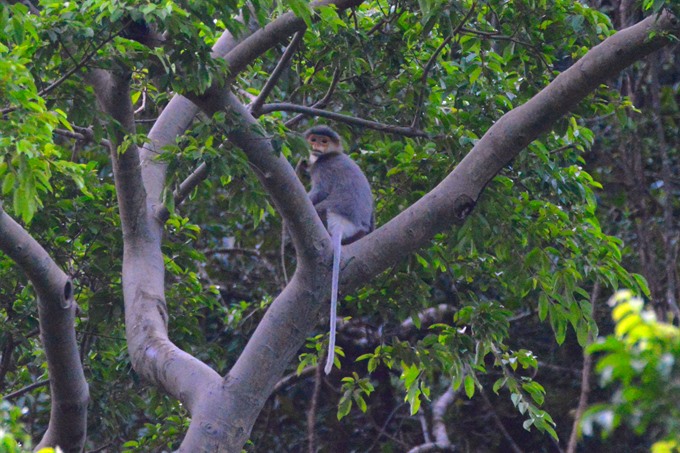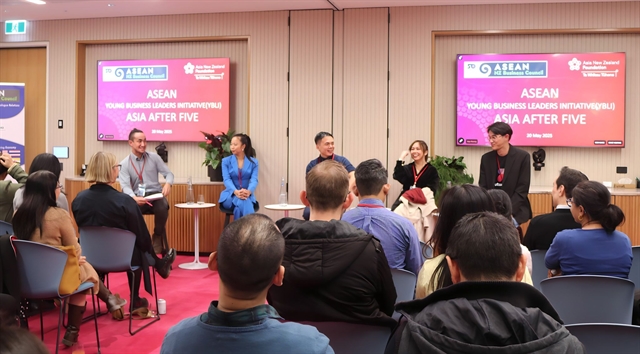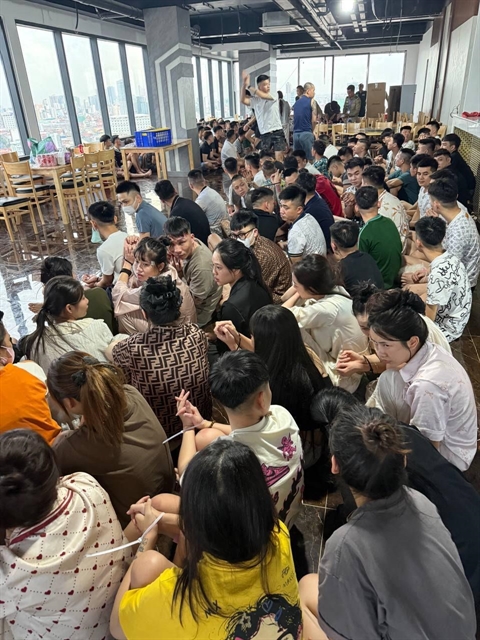

A group of rare animals in Quảng Nam Province have some human friends. They are the farmers who live near the gray-shanked douc langurs’ forest home and protect them from their human enemies.
 |
| A gray-shanked douc langur (pygathrix cinerea) is snapped in a forest in Quảng Nam Province’s Núi Thành District. — VNS Photo Ái Tâm |
A group of rare animals in Quảng Nam Province have some human friends.
They are the farmers who live near the gray-shanked douc langurs’ forest home and protect them from their human enemies.
These enemies are people who want to hunt them.
So, people from the farming villages keep an eye on them, day and night.
A farming community in the central province of Quảng Nam has been volunteering to protect a critically endangered troupe of gray-shanked douc langurs (pygathrix cinerea) that have made the area their home.
The troupe, with an estimated 50 individuals, has been living peacefully in a 5ha area of forest in Tam Mỹ Tây Commune, where villagers protect them from poachers.
“I saw them (langurs) the first time when I was on the way to find firewood in the forest. I knew they were monkeys, but didn’t realize they were endangered langurs. They lived high in the trees, and we could only get within 30m,” Nguyễn Dư, 38, said.
“More than 200 villagers have agreed to protect the langurs by assigning members of families to patrol day and night,” he said.
“The guards patrol a logging facility and keep a close eye on the langurs,” he explained.
Dư said the guards did not receive payment for protecting the langurs.
Lương Thanh Vân, another local, said: “The village has peacefully sheltered by Dồ Mountain for generations, and we think of the mountain and forest as the Gods of the village as well as the langurs.”
“The primates and wildlife are hunted for luxury meals or bones used for medicine. Hunting is banned in the community, but poachers from neighbouring villages still came to hunt them,” Vân said.
Võ Ngọc Danh, 59, was happy to be given the opportunity to protect the langurs, even though he was busy on his farm.
“I meet them (the langurs) every morning on the farm. The langurs seem to recognise us now and have been living with the community for decades,” he said.
“Villagers treat them as good friends from the jungle,” he said.
Phan Minh Huấn, head of Núi Thành District’s ranger station, said villagers informed them about illegal hunting whenever they suspected poaching.
“Our ranger force is assigned to cover more than 26,000ha of forest in the district, so communication with the local community has helped us promote forest protection,” Huấn said.
“The endangered langurs have sheltered in a large forest area, but their habitat has been narrowed due to the expansion of logging in recent years. That’s the reason the local rangers and community are working to stop humans from encroaching more on their territory,” he added.
Huấn said the province planned to turn the Hố Giang Thơm hot springs into an eco-tourism resort, and the conservation of the endangered langurs would help promote tourism and change the community’s livelihood from forestry to tourism services.
Vice chairman of Núi Thành District People’s Committee Nguyễn Văn Thịnh said the province had extended a strict protected area for the langurs.
Thịnh said the conservation of the endangered langurs aimed to limit the damage caused by human activities and restore the natural habitat for the primates.
He said the langurs would lure biologists to the area, and promote sustainable eco-tourism services in the poverty-stricken region.
The province planned to allocate funds for the volunteers and rangers to help them protect the langurs, Thịnh added.
According to Trần Hữu Vỹ, director of the Centre of Biodiversity Conservation, the langurs need special protection as rapid logging had damaged their habitat.
Vỹ said the centre, in co-operation with the province, had been doing a biodiversity assessment of the langur habitat before launching a master plan on the conservation of the langurs and other fauna and flora species in the area.
Experts from the Frankfurt Zoological Society’s Việt Nam Primate Conservation Programme said around 1,000 gray-shanked doucs were living in forests in the provinces of Quảng Nam, Quảng Ngãi, Bình Định, Kon Tum and Gia Lai.
Expert Hà Thăng Long, head of the representative office of the Frankfurt Zoological Society in Việt Nam, said the gray-shanked douc langur, which can only be found in Việt Nam, is listed on the International Union for Conservation of Nature (IUNC) Red List as one of the world’s 25 Critically Endangered primates. — VNS
GLOSSARY
A farming community in the central province of Quảng Nam has been volunteering to protect a critically endangered troupe of gray-shanked douc langurs (pygathrix cinerea) that have made the area their home.
Volunteering means doing work without expecting to be paid.
If animals are critically endangered, they are not only in danger of dying out but they are also living in a situation that could see them die out quite suddenly.
A troupe of monkeys is a group of them.
Every living plant and animal has a scientific name, which is a bit like a person having a first name and a family name. One word in the scientific name of a plant or animal tells its individual name while the other tells what group, or family of plants or animals it comes from. These names are in the ancient European language called Latin.
The troupe, with an estimated 50 individuals, has been living peacefully in a 5ha area of forest in Tam Mỹ Tây Commune, where villagers protect them from poachers.
Poachers are people who kill wild animals that are not theirs to kill.
“More than 200 villagers have agreed to protect the langurs by assigning members of families to patrol day and night,” he said.
Assigning someone a job means giving them a duty.
To patrol means to travel around and check that everything is okay.
“The guards patrol a logging facility and keep a close eye on the langurs,” he explained.
Logging means chopping down big forest trees for their logs.
Lương Thanh Vân, another local, said: “The village has peacefully sheltered by Dồ Mountain for generations, and we think of the mountain and forest as the Gods of the village as well as the langurs.”
Sheltered means protected.
“The primates and wildlife are hunted for luxury meals or bones used for medicine.”
Primates are the family of animals that includes humans, monkeys and, of course, langurs.
“The langurs seem to recognise us now and have been living with the community for decades,” he said.
A decade is a period of ten years.
Phan Minh Huấn, head of Núi Thành District’s ranger station, said villagers informed them about illegal hunting whenever they suspected poaching.
To inform someone of something means to give them information about it, or tell them.
Illegal means against the law.
“Our ranger force is assigned to cover more than 26,000ha of forest in the district, so communication with the local community has helped us promote forest protection,” Huấn said.
Communication means sending messages between people, whether it is by talking, writing or many other ways.
To promote forest protection means to make people think it is a good idea.
“The endangered langurs have sheltered in a large forest area, but their habitat has been narrowed due to the expansion of logging in recent years.
A habitat is a place where an animal or a plant can get the correct amount of food and shelter to survive.
Narrowed, in this case, means “made smaller”.
If there has been an expansion of logging, there has been more logging.
That’s the reason the local rangers and community are working to stop humans from encroaching more on their territory,” he added.
When humans are encroaching on their territory, they are moving in on their land.
Huấn said the province planned to turn the Hố Giang Thơm hot springs into an eco-tourism resort, and the conservation of the endangered langurs would help promote tourism and change the community’s livelihood from forestry to tourism services.
Eco-tourism is tourism with an environmental theme.
Vice chairman of Núi Thành District People’s Committee Nguyễn Văn Thịnh said the province had extended a strict protected area for the langurs.
To extend a protected area means to make more land protected than before.
Thịnh said the conservation of the endangered langurs aimed to limit the damage caused by human activities and restore the natural habitat for the primates.
Conservation means keeping things that are valuable, especially the natural environment, in its original state.
To limit means to not allow more of something to happen. In this case it is to not allow any more damage.
He said the langurs would lure biologists to the area, and promote sustainable eco-tourism services in the poverty-stricken region.
To lure means to attract.
Biologists are scientists who study and know a lot about living things, especially plants and animals.
To promote something means to say good things about it.
If something is sustainable it can look after itself and not get destroyed through being used.
If a region is poverty-stricken, people there are very poor.
The province planned to allocate funds for the volunteers and rangers to help them protect the langurs, Thịnh added.
To allocate funds for volunteers means to put money side to be able to have them working.
According to Trần Hữu Vỹ, director of the Centre of Biodiversity Conservation, the langurs need special protection as rapid logging had damaged their habitat.
Rapid means quick.
Vỹ said the centre, in co-operation with the province, had been doing a biodiversity assessment of the langur habitat before launching a master plan on the conservation of the langurs and other fauna and flora species in the area.
“In co-operation with” means “working together with”.
Where there is biodiversity, there are many different types of plants and animals living together in one place, and off one another.
An assessment is an opinion that someone reaches after studying something.
Fauna means animals.
Flora means flowers.
Species of flora and fauna are types of plants and animals.
WORKSHEET
State whether the following sentences are true, or false:
ANSWERS: 1.True; 2. True; 3.False; 4. True; 5.True.









